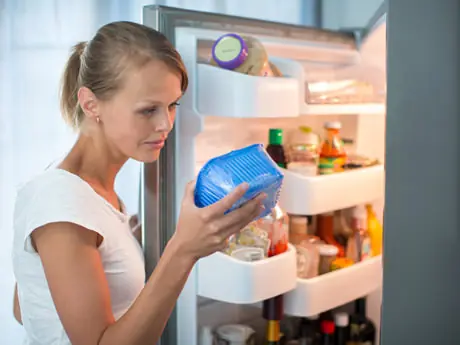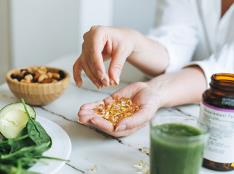
How long food really lasts and whether or not it can still be eaten is a mystery. From food shelf life and freezer burn to brown bananas and thawed meat, get the facts once and for all.
True or false: Foods can last forever in the freezer.
True. Going into my mother's freezer is like taking a trip down memory lane. She has a piece of my sister's wedding cake that's just celebrated its 18th anniversary. But even though frozen foods are safe forever, the activity of enzymes in animal foods, vegetables and fruits can adversely affect their quality. Freezing slows, but does not stop, the enzyme activity.
That's why food in the freezer has a "quality" shelf life that varies depending upon the food. For instance, hamburger has a freezer shelf life of three to four months. And any food that you freeze has to be wrapped in heavy-duty aluminum foil, plastic wrap or an airtight freezer bag.
Here are a few examples of foods you might typically freeze and their recommended storage durations:
Chicken or turkey, whole: 1 year
Hamburger and Other Ground Meats : 3 to 4 months
TV dinners/frozen casseroles: 3 to 4 months
Cooked meat or poultry: 4 months
Soups and Stews: 2 to 3 months
Pizza: 1 to 2 months
For more storage dates, go to: http://www.foodsafety.gov/keep/charts/storagetimes.html
True or false: You can leave coffee in the pot and drink it the next day.
True. Coffee will eventually grow surface mold, but usually not in one day, says Donald W. Schaffner, Ph.D., extension specialist in food science and professor at Rutgers, The State University of New Jersey. But even though it's drinkable, it won't taste as fresh because the compounds that form coffee's characteristic aroma and flavor are volatile, meaning that they will evaporate and be lost at room temperature, says Purnendu C. Vasavada, Ph.D., a professor of food science and microbiology at the University of Wisconsin, River Falls. Refrigerating the coffee will help keep it tasting fresher the next day.
More: Coffee Alternatives for Athletes
True or false: Condiments like mayonnaise, ketchup, mustard and barbecue sauce can last a long time in the fridge—almost forever.
True, but not forever. They'll last about six months, which to most of us sounds like a pretty short time considering that our condiments seem to be in there for years. They will eventually spoil, due to either chemical changes or bacterial growth. But keep in mind that these bacteria are not the ones that make us sick; they just spoil the taste, says Schaffner. "One of the reasons condiments last as long as they do is because they have an acidic environment (e.g., the vinegar in ketchup), and bacteria don't do well in that situation," says Keith R. Schneider, Ph.D., a professor of food science at the University of Florida in Gainesville. As far as mayo is concerned, Dr. Schneider says it gets a bad rap and is not really as dangerous as its reputation. He also reminds us that rancid foods are not necessarily dangerous—they just taste bad.
More: How to Make Your Own Condiments
True or false: Keeping bread in the refrigerator will prevent it from going stale.
False. Bread actually gets stale faster in the fridge. However, if it's hot and humid in your house, refrigeration retards mold growth. According to Schaffner, "Bread goes stale because of changes to the starch molecules. As bread bakes, the heat of cooking changes the starch molecules so that they can absorb water. Once the bread is baked, the starch starts to lose moisture, and the starch molecules toughen up—this is staling."
You can freeze your bread. The staling process stops in the freezer.
More: How to Choose the Healthiest Bread
$Pagebreak$True or false: Eating bananas that have turned brown or black is perfectly fine.
True. I always thought the black part of the fruit was unsafe, but it's OK if you like the way it tastes. "The color change is due to biochemical changes in the fruit, not to the presence of harmful bacteria," says Schaffner.
The best place to store bananas is at room temperature unless you want to stop the ripening process. Keeping them refrigerated will do that, but it will also darken the peel (not the edible part).
More: 8 Pre-Workout Ways to Fuel With Bananas
True or false: You can refreeze meat, poultry and other foods once they've been defrosted.
True. Once frozen food is thawed in the refrigerator, it is safe to refreeze it without cooking, although there may be a loss of quality due to the moisture lost through defrosting. Also, after cooking raw foods that were previously frozen, it is safe to freeze the cooked foods. If cooked foods are frozen and then thawed in the refrigerator, you may also refreeze the unused portion.
Repeated freezing and thawing can affect the texture, so the quality may not be as good, but as long as the food is thawed properly (so that any pathogens present don't multiply to dangerous levels), it is an acceptable practice, says Schaffner. However, if you refreeze foods that were left out or thawed incorrectly and have grown dangerous bacteria, you will be refreezing a dangerous food, cautions Schneider, who also advises against refreezing cooked products because, he says, it's unlikely that they will taste good.
Refreezing will more than likely "cause a few taste issues—for example, if ice cream goes through several freeze-thaw cycles, you will get a defect called 'sandiness,' which is a gritty texture due to precipitation of lactose. If you subject meat to repeated freeze-and-thaw cycles, you may have excessive drip loss due to damage to meat tissue. The same thing happens with frozen juice," says Vasavada.
More: 3 Protein-Rich Recipes That Use Rotissere Chicken
True or false: Freezer burn is caused by dangerous pathogens, and the food should be discarded immediately.
False. Freezer-burned food is perfectly safe. It just won't taste very good because it may be tough and dried out, says Schaffner. Freezer burn results from trapped air that causes moisture crystals to form around the food and change it physically. "Any alteration in the physical properties of a food will affect the taste. We've all witnessed how cooking a food changes it. Cut freezer-burned portions away either before or after cooking the food. Heavily freezer-burned foods may have to be discarded," adds Luce.
Freezer burn can be prevented by wrapping food tightly in a moisture-proof barrier (e.g., plastic wrap or a sealed bag). Make sure that there is no air left in the bag or plastic wrap before sealing. Wrapping it in multiple layers can also help. However, foods that are left in the freezer too long (even when well-wrapped) will suffer freezer burn, so it's best to date all packages, and use the oldest packages first, suggests Schaffner.
More: 8 Tricks to a Healthier Breakfast
 Stay healthy with our nutrition guide.
Stay healthy with our nutrition guide.









Discuss This Article